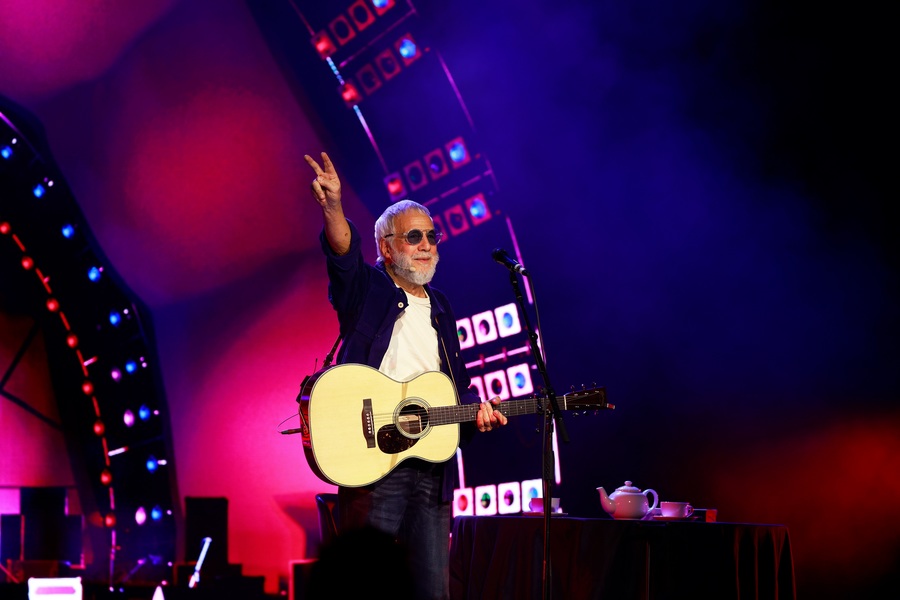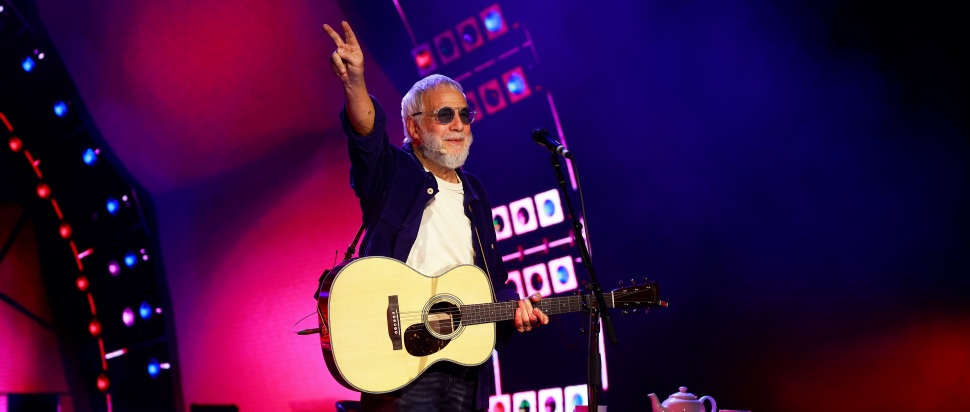Yusuf / Cat Stevens @ Glasgow Royal Concert Hall, 22 Sep
Part book tour, part concert, tonight does little to diminish the legend of Yusuf / Cat Stevens – but doesn't add much either
This Yusuf / Cat Stevens tour exists in the awkward space between a book tour and a concert, not fully committing to either. While it's a thrill to get an intimate glimpse of an artist of this stature, it feels like a missed opportunity to delve into his fascinating personal history or to revisit his enduring hits in a stripped-back setting. Neither aspects are fully realised (though the musical side is better represented) and as a result it's hard to feel like you've really got a better sense of the man born Steven Demetre Georgiou.
He comes out striding and strumming, Britney mic in place, performing quick renditions of Miles from Nowhere and Mighty Peace, starting an unfortunate trend of shortened songs. Yusuf is eminently personable and enthusiastic, and his gentle voice and demeanour show little sign of strain nearly 60 years on from his humble beginnings in the music industry. His songs have always tended towards simplicity in their arrangements, while his lyrics still ring true from his warm tenor, even if they do skew a little saccharine at times. Put simply – he's one of the greatest songwriters of his generation and any opportunity to see him performing should be taken.
However, the approach tonight is to provide a chronological journey through his life, punctuated with stories that give a superficial look at the details, with hand-drawn animations bringing his tales to life, and a scattering of songs that are mostly chosen because they're absolute bangers rather than their relevance to the narrative.
The first half of the set follows his childhood and career up until 1977; an inauspicious upbringing in London, early success and a meteoric rise; a terrifying bout of tuberculosis and early flirtations with spiritualism; disillusion and alienation with the music industry, and the eventual commitment to Islam. There is little in the stories that even a medium-level Yusuf fan wouldn't be aware of, though some tales hint at further details that one can assume are elaborated on in the book – Cat On the Road to Find Out. What really happened when he took acid with Jimi Hendrix?
The inspiration behind Father and Son is well-known (it was written for a quickly shelved play set during the Russian Revolution), but the framing provides a nice bit of context for the most moving song of the evening. The first half ends with Yusuf's near-drowning incident in Malibu in 1976, the direct link to his conversion to Islam. The Wind is a lovely song to usher in the interval, though it feels like it's been retroactively shoehorned to represent this major life decision considering it was written five years earlier.

Image: Yusuf / Cat Stevens @ Theatre Royal Drury Lane, London by Rhys Fagan
Part two of the evening focuses on Yusuf's retreat from music and public life, focusing on his newfound faith and raising his children. There are fewer laughs and cheers, and the songs become a little more obscure. This portion skates over the more contentious aspects of his background: the “misunderstanding” when he appeared to endorse the fatwa on Salman Rushdie; his own persecution in the U.S. following 9/11; his libel cases, humanitarian work and slow return to public life.
These 40-odd years are more or less glossed over, and although Yusuf's politics are unapologetically pacifist, he still seems unable (or unwilling) to even name the key factors in these scenes, like Rushdie or Gaza, as though nervous around anything that could be interpreted as taking a side. The well-known songs here lean towards the mawkish (Morning Has Broken; Moonshadow) and the main set-closing rendition of Peace Train exemplifies Yusuf's nebulous position in its naive questions: 'Why must we go on hating? / Why can't we live in bliss?'
Wild World gets the crowd back on side during the encore, and demonstrates that Yusuf's songs will ultimately do more for unity and his legacy. He could rightly point out that he doesn't owe anyone a thesis on his politics or philosophy, but in the context of a show that purports to provide an “in-depth” look at his life, there are elements to his story that are missing vital context or explanation through their superficial treatment.
The power and beauty of Yusuf's repertoire is undoubtedly timeless. But maybe we'll have to actually buy the book to get the full story...
